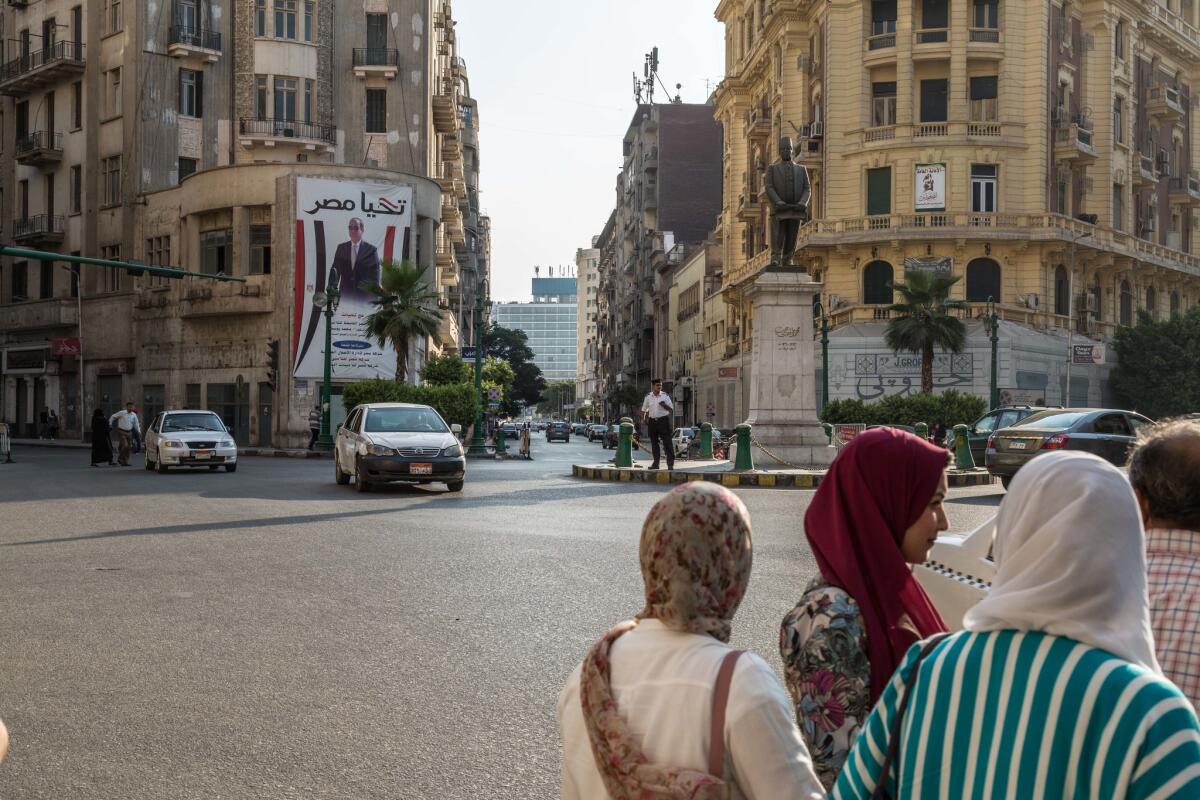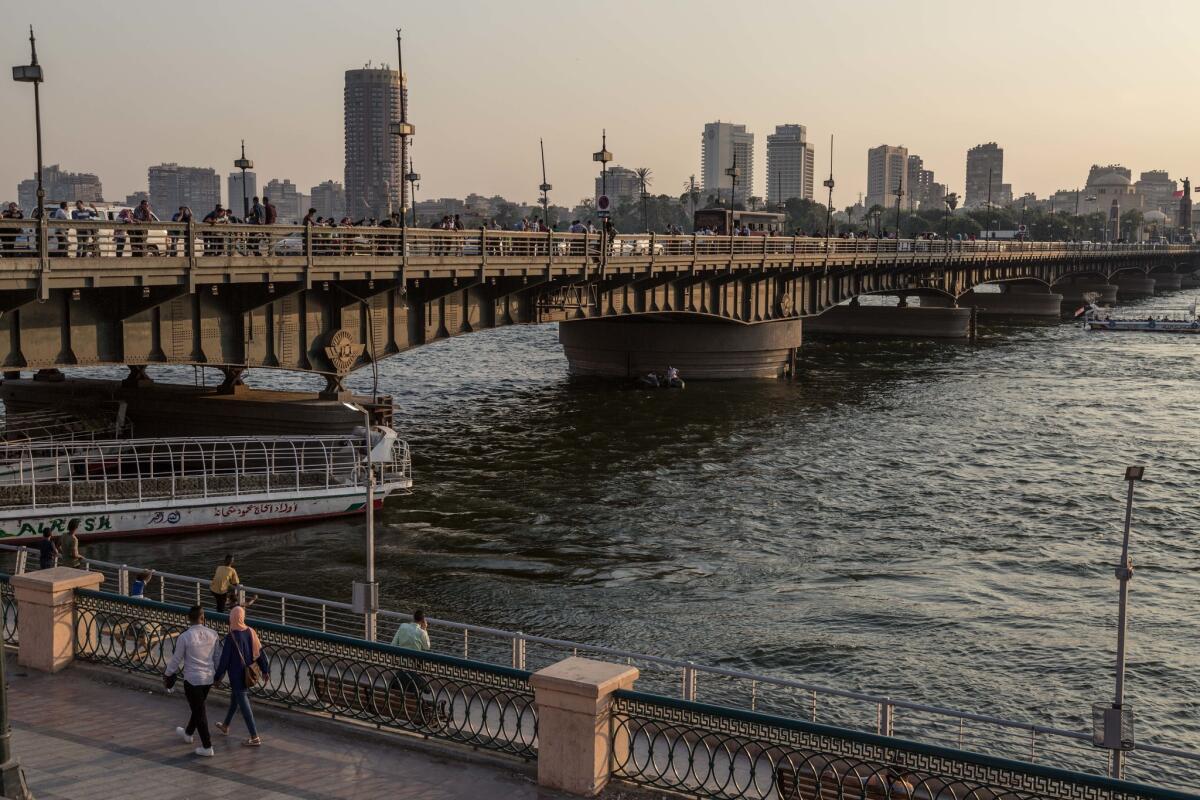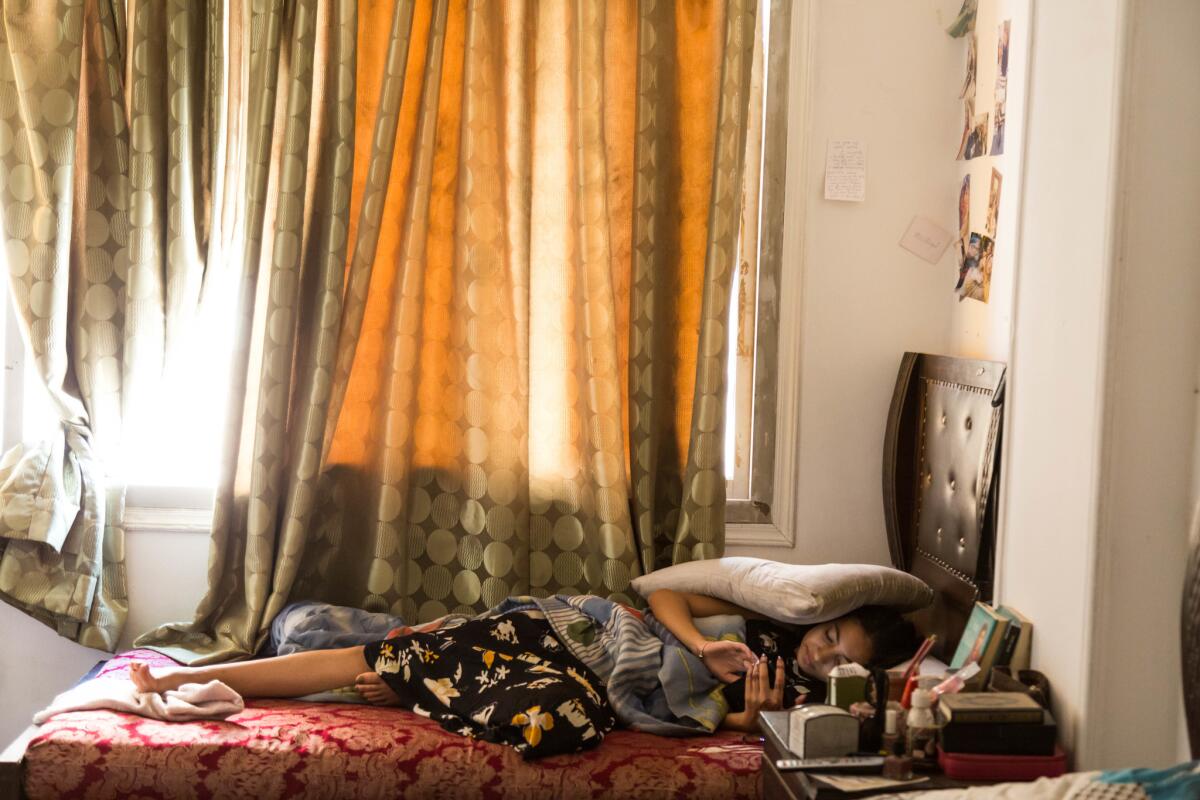Five years after the noisy ouster of an Islamist president, Egyptians are still frustrated — but quiet

Reporting from Cairo — A daughter’s wedding should be one of the happiest occasions in a man’s life. But the impending nuptials of Ahmed Adam’s oldest child have been keeping him up at night.
“Sara is a big problem for me,” the 54-year-old postal worker said one recent afternoon. He was in his family’s third-floor flat in a dusty Cairo suburb populated by auto-parts shops.
Five years after Abdel Fattah Sisi swept to power in a military coup promising Egyptians stability and prosperity, Adam’s problem is money, specifically how he can raise enough on his civil servant’s salary of about $130 a month to furnish the new couple’s home with everything from a can opener to a living room sofa, per his traditional obligations as the bride’s father.
After nearly 30 years at a secure government job, Adam never dreamed that his monthly wage would barely cover a week’s worth of expenses for his family of five — let alone provide for big expenditures like a wedding. Like most public workers, he supplemented his income with extra cash at a second job, moonlighting as an accountant for a poultry business, a janitor, even a clerk in an ice cream shop. Somehow he managed to make ends meet.
But that is no longer the case for the Adams or countless other Egyptian families whose incomes have failed to keep pace with skyrocketing prices spurred by measures designed to rescue an economy ravaged by years of chaos after the 2011 revolution.

On June 30, 2013, following days of rolling blackouts, gas lines and other symptoms of economic malaise, fed-up citizens filled Egypt’s squares in the sweltering summer heat to demand the exit of Islamist President Mohamed Morsi, who was ultimately ousted in a military coup led by Sisi, now Egypt’s leader. Five years later — with Sisi recently reelected to a second four-year term — Egyptians are in some ways just as frustrated, but protests are now illegal, and the streets remain quiet.
Some have dared to voice their discontent on the internet. After officials announced the latest round of steep price hikes in late June, for fuel, electricity and drinking water, several hundred thousand tweets appeared under the Arabic hashtag #Sisi_leave, though an opposing, albeit smaller, camp quickly countered with adulation for the Egyptian president: #myleaderisSisiandproud.
The days when Sisi enjoyed such widespread popularity that his face was stamped on such products as bottles of cologne and women’s underwear are long gone.
In 2016, in a bid to win back investors and desperately-needed foreign currency, Egypt struck a $12-billion loan deal with the International Monetary Fund. In exchange, the government agreed to phase out wasteful energy subsidies, levy a new value-added tax and float the Egyptian pound — measures that were lauded by economists and business leaders as long overdue, but that hit ordinary Egyptians hard. By last summer, inflation had climbed above 30%.
In the latest round of increases, announced in June, officials hiked the cost of drinking water by up to 45%, electricity an average of 26% and fares on the Cairo metro nearly tripled. Other prices are sure to follow suit.
Analysts say those painful moves are starting to pay off. Egypt’s economy is growing at a modest clip and its budget deficit is narrowing. Inflation calmed down to 13% in March and was expected to fall further. And the official unemployment rate fell to its lowest level in eight years.
Perhaps most important is the gradual return of tourism, a key source of not just dollars, but a range of decent-paying jobs, such as drivers and scuba-diving instructors. After seven lean years when one thing after another seemed to conspire to scare off visitors, including political uprisings, plane crashes and terrorist attacks, bare-legged foreigners can once-again be seen touring the pyramids and Cairo’s ancient souks.
Tourism numbers so far this year are up 30% from last year, and hotel occupancy rates are at their highest since 2010.
There’s no doubt that the government’s tough austerity measures are starting to yield positive results, at least on paper. “Given that the economy is strong, or much stronger than it was,” said Angus Blair, a Cairo-based analyst at investment bank Pharos Holdings, “the question is when can that start trickling down?”
Ahmed Adam’s youngest daughter, Hagar, is not about to hold her breath. A striking 18-year-old with waist-length hair and a fondness for belting out Alicia Keys lyrics, she’s the baby of her family and also its biggest breadwinner.
As a young girl, she watched enough satellite TV to teach herself English, which enabled her to land a job as a teacher at an international preschool earning $280 a month. That’s more than double her father’s salary and significantly above the country’s average monthly wage of $224 in 2016, the most recent year for which statistics are available.

Currently, Hagar, who is about to graduate from public high school, spends most of her wages on private tutors, a crucial expense that most Egyptian parents must beg, borrow or steal to pay for if they want their kids to have a shot at attending college. Like her older sister, Sara, 27, who works for a government ministry, and her brother, Abdul Rahman, 25, who is waiting tables at a summer resort on Egypt’s Mediterranean coast, she also helps with the rent and household bills.
When she was younger, Hagar dreamed of becoming a flight attendant and traveling the world. Now she has a vague idea that she’d like to study foreign languages and perhaps work as a translator. But her main ambition? “Be financially stable. And leave Egypt.”
She acknowledges that if she got such an opportunity, her parents probably wouldn’t allow Hagar, an unmarried female, to travel abroad. “When I grew up, I realized that there’s a lot of things that I want to do, but I can’t,” she said.
That hopeless sentiment among Egyptian youth crosses boundaries of gender and class.
“Opportunities are almost zero now in Egypt,” said Abdul Rahman Khalaf, 25, who grew up in a leafy, upscale district of the capital and studied engineering at the Arab Academy of Science and Technology, where he developed a passion for building drones.
Last year, though, he moved to Dubai to take a job in the oil and gas sector, at Halliburton, where as an assistant he earns around 10 times what he’d make as a full-fledged engineer back home in Egypt.
In order to stem the brain drain and create jobs for the approximately 700,000 Egyptians who enter the job market each year, the state needs to do things like support small business and promote official transparency to encourage real investment, said economist Ziad Bahaa-Eldin. He cited a new bankruptcy law and “one-stop shops” to register prospective new businesses that have appeared in TV commercials recently in an attempt to counter perceptions of Egypt’s notoriously bureaucratic business climate.
“The macro reforms have been correct,” said Bahaa-Eldin. “Our failure has been not managing to transform this into a climate that yields sufficient long-term productive investment.”
Meanwhile, the number of poor Egyptians nearly doubled between 2000 and 2015, when nearly 28% of the population was said to be living below the poverty line, according to a December report by UNICEF. The current percentage is almost certainly higher.
Officials reported in March that 2.5 million needy families had received cash benefits as part of the government programs launched in 2015 as a safety net for the poor, elderly and disabled. But some experts have said the programs are likely reaching only a limited number of people.
A broader problem, said Timothy Kaldas, a non-resident fellow at the Tahrir Institute for Middle East Policy, is the official lack of accountability. For instance, the government is footing at least some of the bill for the so-called New Administrative Capital, a multibillion-dollar planned new city currently being erected in the desert halfway between Cairo and the Suez Canal on a web of military-linked contracts.
“They are telling people to tighten their belts,” said Kaldas, “while the state is living large.”
Scheier is a special correspondent.
More to Read
Sign up for Essential California
The most important California stories and recommendations in your inbox every morning.
You may occasionally receive promotional content from the Los Angeles Times.










